Unit Five(expression)
(广东版)开心英语五年级下册教案 Unit 5(4)
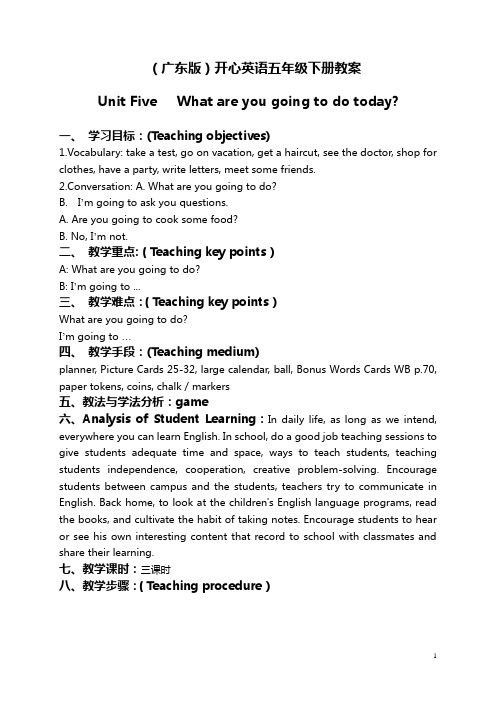
(广东版)开心英语五年级下册教案Unit Five What are you going to do today?一、学习目标:(Teaching objectives)1.Vocabulary: take a test, go on vacation, get a haircut, see the doctor, shop for clothes, have a party, write letters, meet some friends.2.Conversation: A. What are you going to do?B. I’m going to ask you questions.A. Are you going to cook some food?B. No, I’m not.二、教学重点:(Teaching key points)A: What are you going to do?B: I’m going to ...三、教学难点:(Teaching key points)What are you going to do?I’m going to …四、教学手段:(Teaching medium)planner, Picture Cards 25-32, large calendar, ball, Bonus Words Cards WB p.70, paper tokens, coins, chalk / markers五、教法与学法分析:game六、Analysis of Student Learning:In daily life, as long as we intend, everywhere you can learn English. In school, do a good job teaching sessions to give students adequate time and space, ways to teach students, teaching students independence, cooperation, creative problem-solving. Encourage students between campus and the students, teachers try to communicate in English. Back home, to look at the children's English language programs, read the books, and cultivate the habit of taking notes. Encourage students to hear or see his own interesting content that record to school with classmates and share their learning.七、教学课时:三课时八、教学步骤:(Teaching procedure)The first period一、Teaching aims:Vocabulary: take a test, go on vacation, get a haircut, see the doctor, shop for clothes, have a party, write letters, meet some friends.二、Teaching important points :Vocabulary: take a test, go on vacation, get a haircut, see the doctor, shop for clothes, have a party, write letters, meet some friends.三、Teaching difficult points:Vocabulary四、Teaching material:tape, computer, objects.五、Teaching methods、Learning methods:GameTeaching Comprehension:Step 1 Review1.What are you going?2.Are you going to bank?3.听写单词:saw, blew, fell, sat, broke, swept, took, cameStep 2ConversationGetting readyBring a planner to class and show Ss.T: What are we going to do today?Open the planner to today’s date and pretend to read.T: Today we’re going to study English!Draw a time lime on the board (see below).T: (Point to now.) What are you doing now? Repeat. [Ss: What are you doing now?] T: (Point to past.) What did you do yesterday? Repeat. [Ss: What did you do yesterday?]T: (Point to future.) What are you going to do today? Repeat. [Ss: What are you going to do today?]Using the booksHave Ss look at the page.T: (Point to the first picture.) What’s Gogo asking Jenny? [Ss: What are you goingto do today?]T: Let’s listen to the tape and read the story.Play the tape and have Ss follow by looking at the page.T: Let’s listen again and repeat.Play the tape, pausing after each sentence to have Ss repeat.Put Ss into pairs to practice acting out the dialog.Ask volunteers to perform for the class.Extension activityBring in a large calendar and show it to Ss.T: (Point to yesterday’s date.) I (watched a movie) yesterday.T: (Point to today’s date.) I’m going to (read a book) today.Write What did you do _____? And What are you going to do _____? on the board. Point to the dates on the calendar and have individual Ss ask other Ss questions using the structures on the board.Have the Ss answer truthfully.VocabularyGetting readyWrite I’m going to … on the board.T: (Hold up Picture Card 25 take a test word- side up next to the phrase on the board.) Take a test. Repeat. [Ss: Take a test.]T: Show me “take a test”, (Demonstrate a pantomime.)Repeat the procedure with the rest of the cards.Using the bookT: Listen to the tape and repeat. Point to each picture as you say it.Have Ss listen, repeat and point to each picture.Have individual Ss say the words and have the rest of the class point to the corresponding pictures (or do the pantomimes).Introduce the Bonus vocabulary, tonight, tomorrow and the day after tomorrow, using a calendar.Practice 1Getting ready●Ask four Ss to read the questions aloud.Using the book●Write He’s going to ____. On the board.●T: (Point to each picture.) What’s he going to do today? [Ss: He’s going to (go on vacation).]●Play the tape for A, then pause.●T: Is he going to write a letter today? [Ss: No, he’s not. He’s going to shop for clothes.]●Have Ss put a check in the correct box.●Continue with the rest.Extension activityAsk a volunteer to come to the front. T chooses one of the pictures from Practice 1 and shows it to S1 to pantomime. Before S1 starts pantomiming, S1 asks What am I going to do? Have other Ss guess what the pantomime will be by saying You’re going to (Write a letter)., ect. When several Ss have made their guesses, ask S1 to pantomime. The student who made the correct guess pantomimes next.Teaching on the board:Unit 5 What are you going to do today?take a test, go on vacation, get a haircut, see the doctor, shop for clothes, have a party, write letters, meet some friends.教学后记:The second period(Conversation、Practice1&2、Chant activity)一、Teaching aims:Conversation: A. What are you going to do?B. I’m going to ask you questions.A. Are you going to cook some food?B. No, I’m not.二、Teaching important points :A. What are you going to do?B. I’m going to ask you questions.三、Teaching difficult points:A. What are you going to do?B. I’m going to ask you questions.四、Teaching material:tape, computer, objects.五、Teaching methods、Learning methods:GameTeaching Comprehension:TargetGetting readyWrite What are you going to do ____? On the board.Write one of the bonus words, e.g. tomorrow, in the blank and read the sentence. T: What are you going to do (tomorrow)? (Gesture for Ss to repeat.) [Ss: What are you going to do (tomorrow)?]T: I’m going to (meet some friends). (Answer truthfully.)Using the bookPlay the tape a few times and have Ss repeat.Ask individual Ss to read out the sentences.Practice 2Getting ready●Write What are you going to do ____? on the board.●T: (Point to tonight in the chart.) (S1’s name), can you ask the question? [S1: What are you going to do tonight?]●T: (Point to tomorrow in the chart.) (S2’s name), can you ask the question? [S2: What are you going to do tomorrow?]●Have all Ss practice reading the questions aloud to themselves.Using the book●T: (Point to the top row in the chart.) Now write your answers on the page.●Walk around the classroom to provide help if needed.●Put Ss into pairs.●T: Now ask your partner the questions and write the answers on the page.●Give Ss time to ask the questions and write the answers.●Have individual Ss talk about their partners, e.g. (S1’s name)’s going to (meet some friends) tomorrow.Extension activityAfter doing the Practice 2 activity, have Ss choose one of the answers from their partners. Then Ss walk around the room, talking to as many other Ss as possible, e.g.(S1’s name) is going to (play video games) tonight. Are you going to (play video games) tonight? Give Ss a time limit, and ask them to find at least two other Ss who are going to do the same activity. Then ask individual Ss to tell the class about their findings, e.g. (S2’s name), (S3’s name) and (S4’s name) are going to (play video games) tonight.Chant activityGetting ready●Have Ss look at the pictures around the lyrics.●T: (Point to the picture on the left.) What are they going to do?●Elicit the answers from Ss, e.g. They’re going to go to the beach/ swim/ play.●Write I’m going to go to the beach. And I’m going to the beach. On the board.●Explain that both sentences mean the same thing.Using the bookT: Now let’s listen to the chant.Play the tape and have Ss listen.T: (Point to the blanks in the second verse.) Let’s finish these sentences. Listen again.Play the tape again, pausing when necessary for Ss to write the words in the blanks. T: Now let’s chant.Play the tape and have the whole class chant.When Ss have learned the chant, divide the class into two groups.One group chants the questions and the other group chants the answers. Then switch.Extension activityUse the Practice Cards or Student Cards for this game. T invites a student to the front and has him/ her select a card without letting the other Ss see it. Then, Ss try to find out which card S1 chose by chanting questions, e.g. Are you going to (take card he/ she chose, e.g. No, I’m not./ questions until S1 answers Yes, I am. Then, select another volunteer andrepeat the activity.Homework:抄写词句Teaching on the board:Unit 5 What are you going to do today?A. What are you going to do?B. I’m going to ask you questions.A. Are you going to cook some food?B. No, I’m not.教学后记:The third period(Sounds and words)一、Teaching aims:Sound and words二、Teaching important points :Sound and words三、Teaching difficult points:Sound and words四、Teaching material:tape, computer, objects.五、Teaching methods、Learning methods:GameTeaching Comprehension:Getting readyWrite ship and big on the board and underline i.T: (Point to i.) Let’s practice this sound.T: /I/. [Ss: /I/]T: Ship. [Ss: Ship]T: Big. [Ss: Big.]Using the bookHave Ss look at the pictures on the page.T: Let’s listen to the tape.Play the tape and have Ss point to each word as the tape says it.T: Let’s listen again and this time, repeat.Have Ss repeat after the tape.After enough practice, point to the pictures randomly and have Ss say the words. Extension activitySay three or four words at a time. One of the words should not include the /I/ sound (see examples below). Have Ss class their eyes and listen for the sound /I/. Whenthey hear the sound, they raise their hands. Some example words: bag, big, tail, thick, trip, party, clean, stick, tennis.Homework: 抄写音标单词。
Unit Five 现在进行时
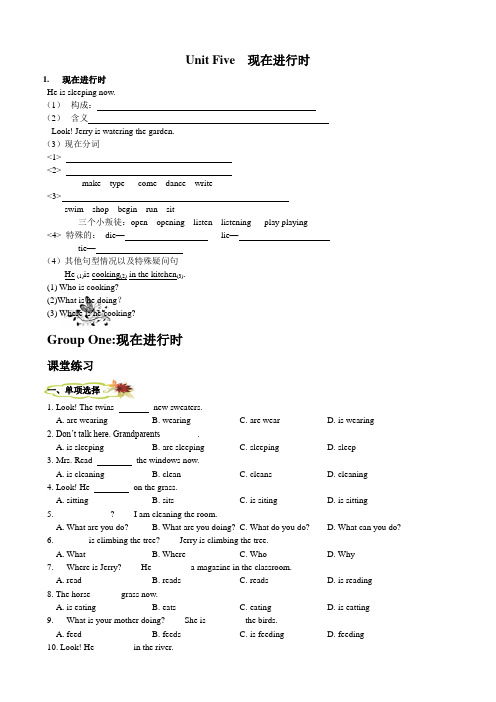
Unit Five 现在进行时1.现在进行时He is sleeping now.(1)构成:(2)含义Look! Jerry is watering the garden.(3)现在分词<1><2>make type come dance write<3>swim shop begin run sit三个小叛徒:open opening listen listening play playing<4> 特殊的:die—lie—tie—(4)其他句型情况以及特殊疑问句He (1)is cooking(2) in the kitchen(3).(1) Who is cooking?(2)What is he doing?(3) Where is he cooking?Group One:现在进行时课堂练习一、单项选择1. Look! The twins new sweaters.A. are wearingB. wearingC. are wearD. is wearing2. Don’t talk here. Grandparents ________.A. is sleepingB. are sleepingC. sleepingD. sleep3. Mrs. Read the windows now.A. is cleaningB. cleanC. cleansD. cleaning4. Look! He on the grass.A. sittingB. sitsC. is sitingD. is sitting5. --- __________? --- I am cleaning the room.A. What are you do?B. What are you doing?C. What do you do?D. What can you do?6. _______ is climbing the tree? --- Jerry is climbing the tree.A. WhatB. WhereC. WhoD. Why7. --- Where is Jerry? --- He ________ a magazine in the classroom.A. readB. readsC. readsD. is reading8. The horse ______ grass now.A. is eatingB. eatsC. eatingD. is eatting9. --- What is your mother doing? --- She is ________ the birds.A. feedB. feedsC. is feedingD. feeding10. Look! He ________ in the river.A. am swimmingB. am going to swimmingC. is swimmingD. swims二、填空1. Listen! Tom (talk) with his mother in the bedroom.2. Look! Some teachers (come) out of the building now.3. Jerry is (swim) across the river.4. Lucy and I (go) into the park now.5. That man is (shave) off his beard.课后练习一、单项选择1. A dog _______ after a cat now.A. is runningB. runningC. is runingD. is run2. Please look at me! I’m _______ a picture for you.A. drawB. to drawC. drawingD. draws3. What is Jerry _______? He is looking at a big ship.A. doB. doesC. doingD. look4. There are some clouds in the sky, but the sun is ______.A. shiningB. shineingC. shineD. is shining5. that cat sleeping now?A. IsB. AreC. AmD. /6. Listen! Joan ______ in the classroom. She often ______ there.A. is singing, singsB. sings, is singingC. singing, singsD. is singing, is singing7. Where is Susie? She _______ pictures in the classroom now.A. drawingB. is drawingC. drawsD. are drawing8. Sarah and I ______ homework now.A. am doingB. are doingC. is doingD. doing9. Some boys _______ basketball over there.A. playingB. are playingC. is playingD. are play10. Look! The dog is _______.A. sleepingB. sleeppingC. sleepD. sleeps二、改错(在错误处划线并改正)1. They are put on their clothes now. _________2. The boy isn’t play basketball now. _________3. What do they doing? _________4. They is singing under the tree now. _________5. Is Jerry and Lois cooking in the kitchen now? _________三、填空1. Close the window, please! It’s outside now. (rain)2. The tiger is at me now. (look)3. Listen! The mice candies. (eat)4. Who over there now? (sing)5. It’s eight o’clock. The students an English class. (not have)四、句型转换1. Mrs. Jones is dusting the dressing table.否定句: _________________________________________________.疑问句: _________________________________________________?肯定和否定回答: _________________________________________.对划线部分提问: _________________________________________?2. The dog is eating bones near the house.否定句: _________________________________________________.疑问句: _________________________________________________?肯定和否定回答: _________________________________________.对划线部分提问: _________________________________________?2. 一般将来时He is going to buy a house tomorrow.He will buy a house tomorrow.I shall buy a house tomorrow.1.含义:2.构成:a)b)3.区别:be going to 强调,表示“打算…”Will 强调,表示“将要…”4.标志词:tonighttomorrow, the day after tomorrowtomorrow morning, tomorrow afternoon, tomorrow eveningnext year/ week/ monththe week/ month/ year after next5.只能用will的情况1): I will miss you.2): You will enjoy it.3): He will be 5 years old.6.句型转换1)Tom will fly to London next week.否定句:Tom won’t fly to London next week.一般疑问句:Will Tom fly to London next week?回答:Yes,he will. No, he won’t.2)Tom is going to fly to Tokyo next week.否定句:Tom isn’t going to fly to London next week.一般疑问句:Is Tom going to fly to London next week?回答:Yes,he is. No, he isn’t.Group Two 一般将来时课堂练习一、单项选择1. --- ________ you ________ free tomorrow? --- No. I ________ free the day after tomorrow.A. Are; going to; willB. Are; going to be; willC. Are; going to; will beD. Are; going to be; will be2. Charlie ________ here next month.A. isn’t workingB. doesn’t workingC. isn’t going to workingD. won’t work3. He ________ very busy this week, but he ________ free next week.A. will be; isB. is; isC. will be; will beD. is; will be4. My mother ________ me a nice present on my next birthday.A. will givesB. will giveC. givesD. give5. He will ________ to London tomorrow.A. reachB. returnC. arriveD. be6. I _______ to Beijing the day after tomorrow.A. have beenB. goC. will goD. went7. Who talk to us about the future world?A. areB. is goingC. willD. am8. I ________ a house in Beijing in 2012.A. am going to buyB. buyC. broughtD. bought9. She ________ kill the sheep.A. not willB. will notC. is going to notD. not shall10. Jerry eight next year.A. will beB. will isC. be going toD. going to be二、填空1. Mary’s birthday is next Monday, and her mother (give) her a present.2. It is very cold these days. It (snow) soon.3. I (leave) in a minute.4. --- What _________ you (do) after school?--- I (return) home in two hours.5. I __________ (be) tired. I (go) to bed early tonight.课后练习一、单项选择1. My parents _______ go shopping next year.A. is going toB. are going toC. will go toD. will going to2. _______ a concert next Saturday?A. There will beB. Will there beC. There can beD. There are3. He ________ in three days.A. coming backB. came backC. will come backD. is going to coming back4. --- Will his parents go to see Kung Fu Panda 2 tomorrow? --- No, ________ (不去)A. they won’t.B. they doesn’t.C. they aren’t.D. they don’t.5. Tomorrow he ________ a kite in the open air first, and then _______ boating in the park.A. will fly; will goB. will fly; goesC. is going to fly; will goesD. flies; will go6. Let’s out to play football, shall we?A. goB. goingC. wentD. goes7. It ________ us a long time to learn English well.A. will takeB. willC. spendsD. spend8. The train ________ at 11.A. going to arriveB. will be arriveC. is going toD. is arriving9. If it doesn’t rain tomorrow, I happy.A. willB. am going to beC. will beD. am going be10. ________ open the window?A. Will you pleaseB. will youC. You pleaseD. Does you二、改错(在错误处划线并改正)1. He will be going to school tomorrow.2. I am going to 8 years old.3. Jerry is going to London last week.4. Tom asks, “Are you going to be 12 years old?”5. Dylan will finished her work tomorrow.三、填空1. --- _____ you (be) here next Saturday?--- No. I (visit) my teacher.2. --- ______ I (get) you a copy of today’s newspaper?--- Thank you.3. I am afraid there (be) a meeting tomorrow afternoon.I can’t join you.4. Mike (see) the dentist.5. Most of us don’t think their team next time. (win).四、句型转换1. He is going to go to the zoo tomorrow.否定句: .疑问句: ?肯定和否定回答: .对划线部分提问: ?2. Jerry will fly to Sydney the day after tomorrow.否定句: .疑问句: ?肯定和否定回答: .对划线部分提问:。
学术英语_社科Unit5五单元原文及翻译
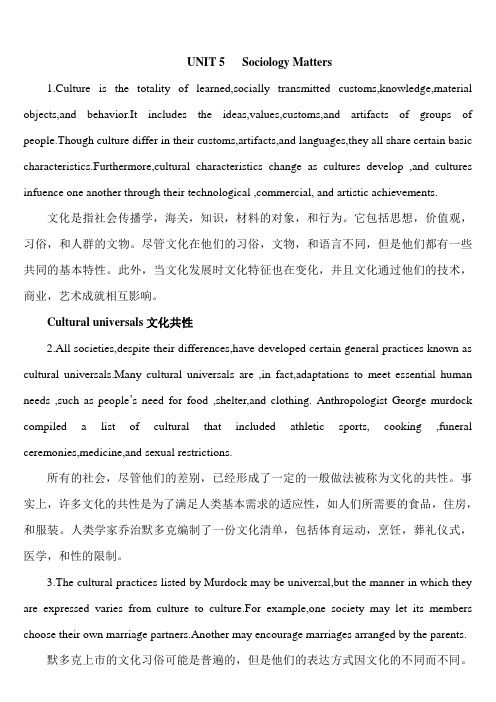
UNIT 5 Sociology Matters1.Culture is the totality of learned,socially transmitted customs,knowledge,material objects,and behavior.It includes the ideas,values,customs,and artifacts of groups of people.Though culture differ in their customs,artifacts,and languages,they all share certain basic characteristics.Furthermore,cultural characteristics change as cultures develop ,and cultures infuence one another through their technological ,commercial, and artistic achievements.文化是指社会传播学,海关,知识,材料的对象,和行为。
它包括思想,价值观,习俗,和人群的文物。
尽管文化在他们的习俗,文物,和语言不同,但是他们都有一些共同的基本特性。
此外,当文化发展时文化特征也在变化,并且文化通过他们的技术,商业,艺术成就相互影响。
Cultural universals文化共性2.All societies,despite their differences,have developed certain general practices known as cultural universals.Many cultural universals are ,in fact,adaptations to meet essential human needs ,such as people’s need for food ,shelter,and clothing. Anthropologist George murdock compiled a list of cultural that included athletic sports, cooking ,funeral ceremonies,medicine,and sexual restrictions.所有的社会,尽管他们的差别,已经形成了一定的一般做法被称为文化的共性。
人教版小学四年级英语上册第五单元Unit Five

PEP小学英语四年级上册第五单元教案四上Unit Five What would you like?教材分析:本单元围绕“食品、饮料和餐具”展开教学,教学内容与日常我的设计生活密切相关,不难激起学生们的学习兴趣,milk, bread, ,water, egg等单词在三年级时听说读都已接触,老师重点让学生在“写”上下功夫,句型在回顾Can I have some ……,please ?的基础上,学习what would you like?句型,用来询问他人的需求,本单元八个四会单词,教师要严格要求,规范指导,为今后写的教学作个铺垫。
一、单元教学目标:1.能力目标:⑴能够询问一日三餐的食物及饮料。
⑵会使用用餐时的基本用语,如:What would you like for ……?Help yourself 等。
⑶能够听懂并发出传递与使用餐具的一些指令,如:Pass me a plate,please .Use the chopsticks.2.知识目标:⑴掌握A、B两部分Read and write中,bread, egg, milk, water, rice, beef, fish, chicken 的拼写。
⑵认读A、B两部分Let’s learn, Let’s talk 中的单词和句子。
(3)理解Let’s do, Let’s chant等部分的内容。
⑷了解story time, Good to know等部分的内容。
3.情感、策略、文化等有关目标⑴情感、态度:激发学生学习英语的兴趣,培养学生学习英语的积极态度,使学生乐于合作参与,勇于进行交际实践。
⑵学习策略:注重合作学习。
⑶文化目标:了解中西方饮食文化方面的一些知识。
二、教学重、难点分析:1.本单元教学重点是A、B两部分的食物、餐具名称以及就餐用语,其中难点是用餐时的基本会话,教师在教学词汇时,应结合过去所学的食物,饮料单词及句型,运用灵活多样的教学方法帮助学生理解、巩固、同时,在教学A、B部分Let’s learn 的词汇时,可适当铺垫渗透Let’s talk 中的句子,如:What would you like for ……?I can use …等,从而降低了对话教学的难度,然后通过朗读,操练,表演等方式使学生比较顺利地掌握用餐会话。
Unit 5 Five Little Sausages(五根小香肠)

Unit 5 Five Little Sausages(五根小香肠)本文从网络收集而来,上传到平台为了帮到更多的人,如果您需要使用本文档,请点击下载按钮下载本文档(有偿下载),另外祝您生活愉快,工作顺利,万事如意!Unit5FiveLittleSausages(五根小香肠)一.打招呼Greeting.Hello,everyone.二.热身warmUpLet’ssingasongaboutone,Two,?one,two,bucklemyshoe,three,f ou r,openthedoor…ok,verygood.三.情景表演ActItout1.我饿了I’mHungry.教师拿出小狗手偶和幼儿打招呼,再唱I’mhungry,最后引出香肠。
Look,,,growl,growl,’’mhungry,growl,growl,growl…Iwanttoeat.”wow,asausage .2.五根小香肠FiveLittleSausages教师出示实物或模型香肠,平底锅,盘子及相应卡片,,twosausages,threesausages,foursausages,,let’,thep angothot,andonewentBAm…结束时,教师把香肠拿个幼儿假装品尝。
3.手指游戏FingerPlay教师做手指动作说唱本单元儿歌。
Now,,two,three,four,’ssingasong….四.游戏活动GameTime1.教师请五名幼儿上前面,每人伸出一个手指放在老师手上进行表演。
Let’?(五名幼儿上前来),…2.五名幼儿带香肠头饰站在绳子围成的圆圈中间,最后按顺序跳出。
Look,,…3.五名幼儿带香肠头饰站在中间,其他幼儿围成圆圈扮演平底锅。
五.动画时间cartoonTimeNow,let’swatchthecartoon.六.亲子游戏FamilyFun家长让幼儿躺在泡沫垫上,幼儿扮演香肠,边做游戏,边唱儿歌。
饭店英语unit05

IV Topic Extension
C:
Let me see…You checked in on Wednesday. It’s see… Wednesday. Friday. Friday. That’s two days. Am I right? days.
G: Yeah. Yeah. C: Have you used any hotel service during your stay? G: Yes. I made a long distance call yesterday and had Yes.
A pleasant greeting when the guests come to settle their bills is necessary. The effect of fast and efficient service in checking them out and a cordial farewell are obvious. When handling check-out, the cashiers are trained to inquire about every recent charge, which may be unrecorded. All charges that a guest incurs must be entered, or posted, on his or her accounts as soon as possible.
In addition to the charge for the guest’s room, there may also be charges resulting from the use of the telephone, the laundry service, the restaurant, the room service, etc.
新编英语教程Unit Five The Santa Ana Joan Didion圣安娜飓风
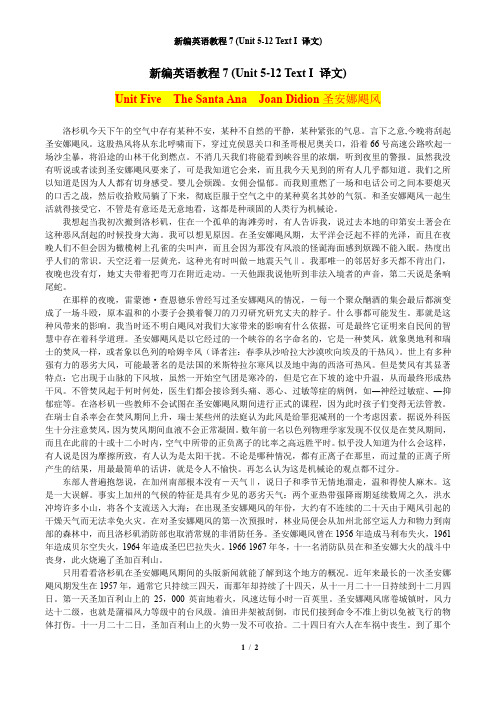
新编英语教程7 (Unit 5-12 Text I 译文)Unit Five The Santa Ana Joan Didion圣安娜飓风洛杉矶今天下午的空气中存有某种不安,某种不自然的平静,某种紧张的气息。
言下之意,今晚将刮起圣安娜飓风。
这股热风将从东北呼啸而下,穿过克侯恩关口和圣哥根尼奥关口,沿着66号高速公路吹起一场沙尘暴,将沿途的山林干化到燃点。
不消几天我们将能看到峡谷里的浓烟,听到夜里的警报。
虽然我没有听说或者读到圣安娜飓风要来了,可是我知道它会来,而且我今天见到的所有人几乎都知道。
我们之所以知道是因为人人都有切身感受。
婴儿会烦躁。
女佣会愠郁。
而我则重燃了一场和电话公司之间本要熄灭的口舌之战,然后收拾败局躺了下来,彻底臣服于空气之中的某种莫名其妙的气氛。
和圣安娜飓风一起生活就得接受它,不管是有意还是无意地看,这都是种顽固的人类行为机械论。
我想起当我初次搬到洛杉矶,住在一个孤单的海滩旁时,有人告诉我,说过去本地的印第安土著会在这种恶风刮起的时候投身大海。
我可以想见原因。
在圣安娜飓风期,太平洋会泛起不祥的光泽,而且在夜晚人们不但会因为橄榄树上孔雀的尖叫声,而且会因为那没有风浪的怪诞海面感到烦躁不能入眠。
热度出乎人们的常识。
天空泛着一层黄光,这种光有时叫做―地震天气‖。
我那唯一的邻居好多天都不肯出门,夜晚也没有灯,她丈夫带着把弯刀在附近走动。
一天他跟我说他听到非法入境者的声音,第二天说是条响尾蛇。
在那样的夜晚,雷蒙德·查恩德乐曾经写过圣安娜飓风的情况,―每一个聚众酗酒的集会最后都演变成了一场斗殴,原本温和的小妻子会摸着餐刀的刀刃研究研究丈夫的脖子。
什么事都可能发生。
那就是这种风带来的影响。
我当时还不明白飓风对我们大家带来的影响有什么依据,可是最终它证明来自民间的智慧中存在着科学道理。
圣安娜飓风是以它经过的一个峡谷的名字命名的,它是一种焚风,就象奥地利和瑞士的焚风一样,或者象以色列的哈姆辛风(译者注:春季从沙哈拉大沙漠吹向埃及的干热风)。
大学英语综合教程 第三册 unit5翻译及原文(翻译下载后就有)文库
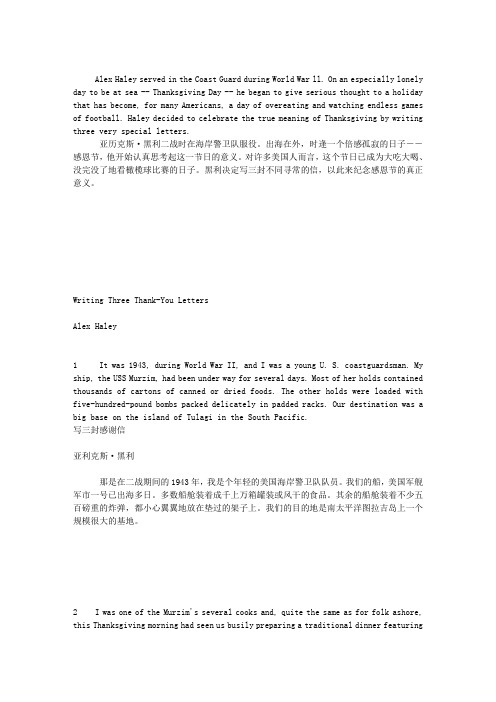
Alex Haley served in the Coast Guard during World War ll. On an especially lonely day to be at sea -- Thanksgiving Day -- he began to give serious thought to a holiday that has become, for many Americans, a day of overeating and watching endless games of football. Haley decided to celebrate the true meaning of Thanksgiving by writing three very special letters.亚历克斯·黑利二战时在海岸警卫队服役。
出海在外,时逢一个倍感孤寂的日子――感恩节,他开始认真思考起这一节日的意义。
对许多美国人而言,这个节日已成为大吃大喝、没完没了地看橄榄球比赛的日子。
黑利决定写三封不同寻常的信,以此来纪念感恩节的真正意义。
Writing Three Thank-You LettersAlex Haley1 It was 1943, during World War II, and I was a young U. S. coastguardsman. My ship, the USS Murzim, had been under way for several days. Most of her holds contained thousands of cartons of canned or dried foods. The other holds were loaded with five-hundred-pound bombs packed delicately in padded racks. Our destination was a big base on the island of Tulagi in the South Pacific.写三封感谢信亚利克斯·黑利那是在二战期间的1943年,我是个年轻的美国海岸警卫队队员。
- 1、下载文档前请自行甄别文档内容的完整性,平台不提供额外的编辑、内容补充、找答案等附加服务。
- 2、"仅部分预览"的文档,不可在线预览部分如存在完整性等问题,可反馈申请退款(可完整预览的文档不适用该条件!)。
- 3、如文档侵犯您的权益,请联系客服反馈,我们会尽快为您处理(人工客服工作时间:9:00-18:30)。
1.quit hunting
2.be crazy about sth/ doing sth
3.fresh-fallen snow
4.crash out of / air crash
5.show off / show out / show around / show up
te in the fall
7.filter through
8. a thermos of coffee
9.head for
10.turn over/ turn to/ turn down
11.settle down
12.be curious about
13.in one’s prime
14.reach up / reach out / reach for
15.walk right up to
16.scratch one’s head
17.poke at my shoulder
18.tremble with anger
19.pick up
20.a dull slam
21.thrill …with
22.with touches of
23.the wrapping for the sandwiches
24.be dressed for / in
25.I wonder if you will really understand.
26.I used to be crazy about the hunting season.
27.I could hardly wait for those dry, cold mornings and then the walk over fresh-fallen sonw, a
fine rifle in my hand.
28.There is a thrill in hunting, an excitement that comes over you when a deer crashes out of the
bush.
29.There’s the bit of showing off with the boys – the fine head of the deer hung high up on the
wall.
30.Silence is like that of a church.
31.It was then that I saw him.
32.The deer walked right up to where I was sitting.
33.a deer in his prime mush have known about men and guns.
34.what happened next is hard to believe.
1.放弃打猎
2.酷爱(做)
3.刚下的雪
4.冲出来/ 空难
5.炫耀/ 送客/ 带领参观/ 露面
6.晚秋
7.透过
8.一暖瓶的咖啡
9.出发
10.翻动/ 着手做/ 拒绝
11.定居,安身
12.对—好奇
13.在---壮年时
14.抬起手/ 伸手拿/ 伸手拿到
15.抓抓头
16.在我肩膀上蹭
17.生气地发抖
18.捡起
19.一声闷响
20.以…使人兴奋
21.点缀着
22.三明治的包装
23.穿着
24.我想知道你是否真的会理解.
25.我以前一直酷爱打猎的季节.
26.我几乎等不到那些干燥寒冷的早晨,手持一支精致的步枪,踏着刚刚落下的白雪上路
27.打猎是令人激动的,当一只鹿窜出灌木丛时,一种兴奋感传遍你全身.
28.你把俊美的鹿头高高挂在墙上,可以向男孩们炫耀.
29.寂静的就像教堂.
30.就在那个时候我看到了他.
31.这头鹿径直走到我坐的地方.。
